Reports Previous Workshops
Ninth Workshop – 25 to 27 September 2019 in Potsdam, Berlin
Module 4.3: Group exercise: block chain as part of new funding schemes. Supporting new formats and platform distribution
Description of the exercise
The MEDICI participants are divided into six groups of 5-6 people, each sitting at one table. The exercise consists of three elements:
- The participants first receive the overall task they need to pursue.
- Then they are pointed to the conversations they need to engage in while pursuing the given task.
- Finally, they present the outcomes of their discussions in a 3-minute-pitch.
- Task
Eurimages has asked the European film funds to join a think-tank on standardising the film development-production-distribution chain in compliance with the European Convention on Cinematographic Co-production. - Conversation
In order to fulfill this task, the funds need to engage in the following two conversations:- Conversation 1: each Think-Tank (i.e. each table in the room) needs to discuss how the development-production-distribution chain could/should be standardised and propose a standard. In developing such a standard, they can:
- depart from the suggestions from the lecture by Florian Glatz (making an archive of the existing films or starting from new projects), or
- go by the lines proposed by Vincent Choukroun who in his presentation proposes a modular revolution by focusing on one part of the chain, trying to standardise it.
- Conversation 2: every Think-Tank needs to identify the relevant bodies, institutions, organisations and players that need to join the next round of conversations in the Think-Tank.
- Conversation 1: each Think-Tank (i.e. each table in the room) needs to discuss how the development-production-distribution chain could/should be standardised and propose a standard. In developing such a standard, they can:
- 3-minute Pitch: The outcomes of both conversations are to be presented in the form of a proposal (3-minute pitch) to Eurimages and the Council of Europe.
Outcomes of the exercise
Group 1
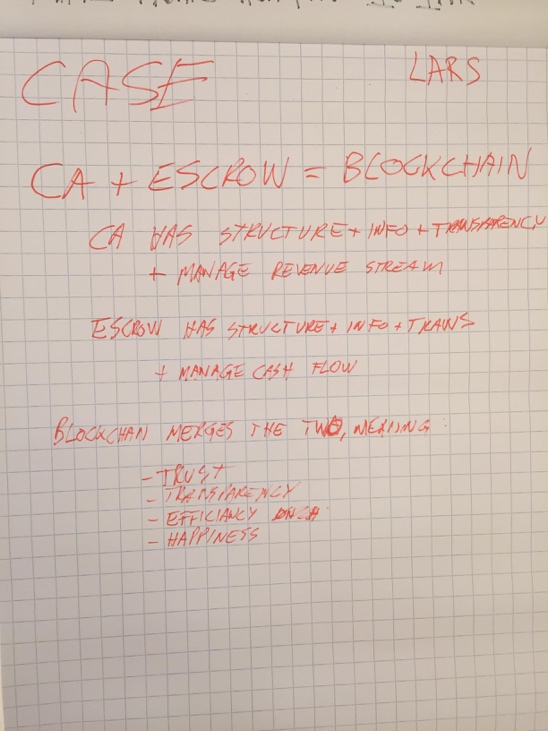
Conversation 1
Our blockchain would combine the responsibility of the collecting agents with the escrow accounts:
- Collecting agents are transparent, have data and structure, and manage the revenue streams of co-productions internationally. They possess information about the contracts, rights and all other insights. This information would be easily importable into the blockchain system where everyone can follow in real-time when and what is paid to the right-holders (directors, producers, scriptwriters, investors, public funds, etc.).
- The escrow account has the same structure and information. It is transparent and tracks the cash-flow of everything that funds pay to the producer. The funds would not pay the money to the collecting agent, but to the escrow account, which the producer will see on blockchain. The blockchain would visualise when the production money comes in, when the producer transfers money to the production, and when co-producers receive funding in their territories.
Therefore, the idea behind our blockchain is to get a full, transparent system of following money from development to the moment the revenue streams start coming. This system would be based on trust, transparency and efficiency.
Conversation 2
For the next round of our Think-Tank discussion, we would in the first place invite the colleting agents and banks.
Group 2
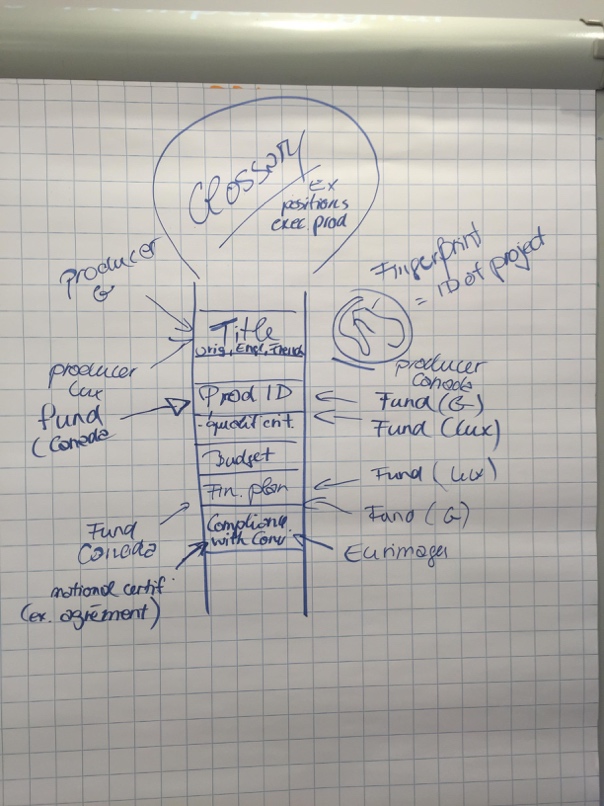
Conversation 1
Our blockchain would focus on production – a specific fragment of the film value chain. We would establish:
- first a glossary that would define all the terms and positions. We would start with film-title since it is different in every language and thus difficult to track. The blockchain would show the original title, English version and French version.
- All the projects in development would receive a sort of a fingerprint that they would keep during the entire production life-cycle. It would help the funds identify the project more easily than now.
- The similar standard would be applied to producers who would get producer ID for easier tracing on blockchain.
All the member countries should make sure that the relevant national requirements in terms of qualifications and certifications are verified. Furthermore, as soon as a funding body confirms its funding for a project, it would appear on blockchain with all the information about the guidelines, terms, criteria, deadlines, expiration dates of the granted financing. There will also be accurate information about the financing plans, budget and how much money should be spent in which country.
Some countries have some budget items that the others do not (for example contingencies), which poses a problem. Hence, our blockchain would make sure that every specific item from national budget forms exists also in the overall budget. Each country would appoint a project manager for the blockchain. They would verify and prove that everything is according to the national regulations and laws. On the other hand, collecting agents would not exist in our blockchain, because we would insist on disintermediation.
Conversation 2
Each country is different. Therefore, the countries should first bring together all the relevant institutions on the national level (regional and national film funds, certification institutions, etc.) and only after the consolidation on national level, they can continue the international conversation on the block-chain related standardisation. National funding bodies would coordinate everything under the monitoring of Eurimages. Eurimages would not regulate the standardisation process on a metalevel, but rather on the operational level as an exchange of the best practices.
Group 3
Conversation 1
Our blockchain would contain a minimum set of data which can travel across different networks. It is important that these basic data are collected and certified by everybody involved (from both private and public sector) in the film, and are available to all the parties.
In developing our blockchain, we would collaborate with producers’ associations, blockchain specialist, representatives of film funds (such as EFADs, Cineregio, etc.), but also with all the parties that provide data such as box-office, recoupment information, festival data, etc.
Conversation 2
Furthermore, we would standardise the chain of titles because it would be the DNA of each production – the main digital asset. This standardisation should be a collaborative project of public film funds and the industry. The piece of the blockchain containing information about the chain of title would be shared to all partners involved. We also need to consider creating an association whose role would be to register the chains of title in blockchain. The data they register could be used in different blockchains (within both private and public networks).
Finally, it would be necessary to define the way each stakeholder should report to blockchain their data about revenues.
Group 4
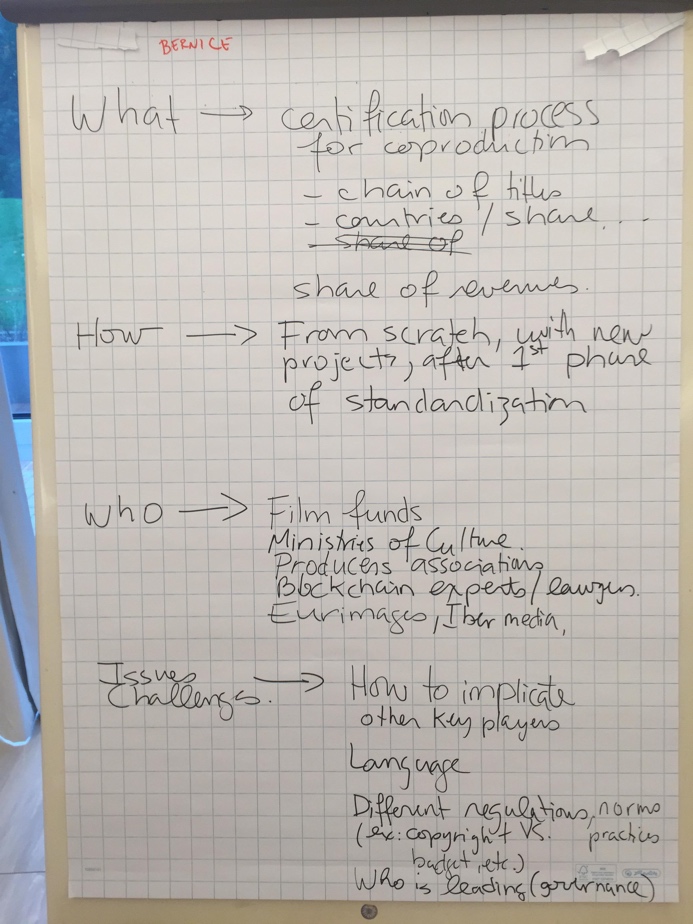
Conversation 1
Our blockchain focuses on co-productions. It contains information about the chains of titles, revenues, recoupments and all other information about how the money travels between different players. We would collect data from scratch with every new project. But the established data standards would be used.
We also discussed the standardisation of the certification process for co-productions. The current national forms are very different from country to county (in different languages, with or without percentages, etc.). We propose a universal form that could be appended to the existing certification letter in every country, containing a minimum information that Eurimages need to know about the project (chain of titles, percentage of financing, share of revenues, etc.). But this task is difficult to implement due to the rigid national legislations that do not allow that.
We also identified some challenges.
- We still do not know how we would involve players such as unions of scriptwriters, directors, etc.
- Meeting with too many companies from different sectors can be complicated because they all have different standards.
- Each territory uses different languages, regulations, practices and copyright laws.
- Who would be in charge of the governance of the blockchain?
Conversation 2
The blockchain standards would be established in collaboration with Ministries of Culture (policy-makers), producers’ associations, lawyers, blockchain experts, Eurimages, Ibermedia and other organisations involved in co-productions.
Group 5
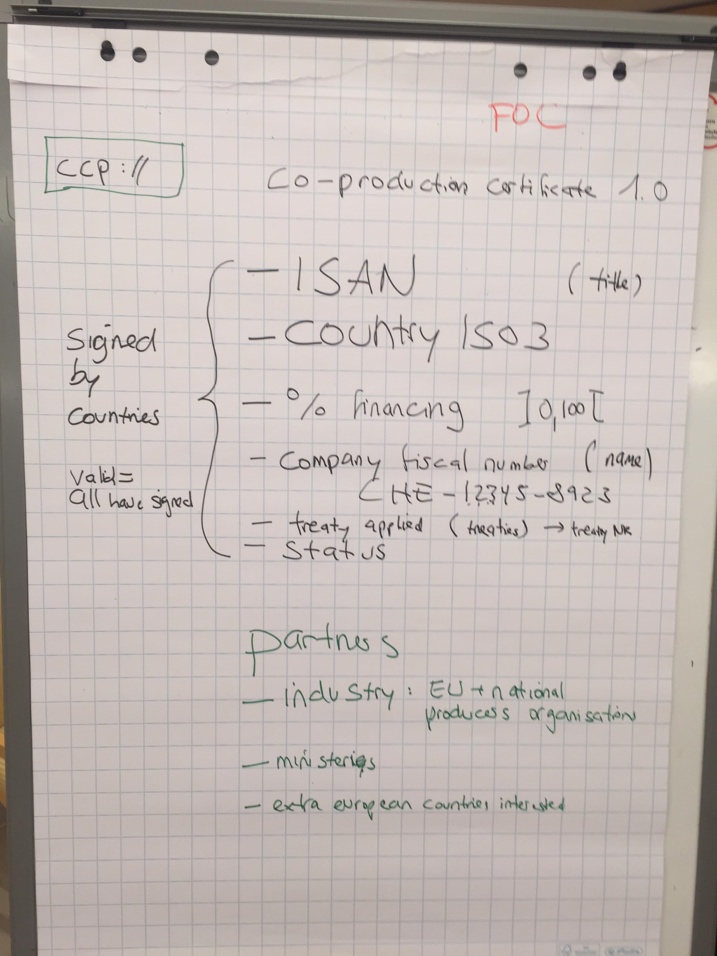
Conversation 1
Our blockchain would be based on the CCP 1.0 protocol, which defines standardised datasets containing the following information:
- Who owns the film (information missing from the IMDB)
- ISO codes for every country, fiscal codes for every company and code for each co-production treaty
- Percentages of financing for every country
- Status information.
The valid documents would be only the ones signed by all the countries and partners participating in a co-production. Blockchain would show only such documents.
Conversation 2
Industry partners would be involved in the conversation, together with the relevant ministries, producers’ associations and representatives of non-European countries that are interested in participating in the blockchain.
In the next phase, we would work on the CCP 2.0 protocol that would:
- Include credible mechanisms for tracking receivers and percentages of revenues in every relevant territory
- Require standardisation of how contracts are made in all territories.
- Resolve the current transparency and accuracy issues triggered by producers’ refusal to report data.
Group 6
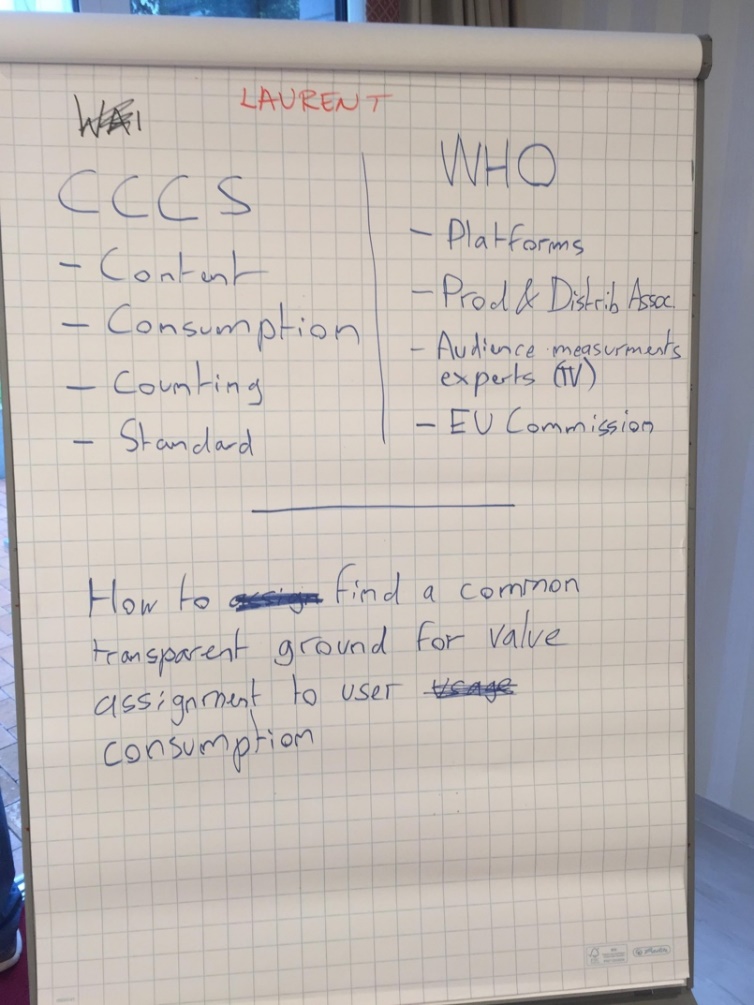
Conversation 1
Our blockchain focuses on VoD and is based on the CCCS (content consumption counting standard) that we have defined. The CCCS should help us find a common ground for value assignment to user consumption on VoD platforms. Right now, there is no transparency of how platforms are recording the way the users are engaging with the content (are they just starting the video? watching only the first 5 minutes? etc.). There is no standard for counting and recording that information and our standard would do that.
We would introduce additional two standards:
- The standard for counting the number of online views for every film based on which Eurimages would award the European audience prize.
- Eurimages could establish a new standard for managing revenues for every film by designing a non-profit VoD platform where all European movies could be placed. Eurimages would quantify things and pay out revenues based on the data coming from this platform.
Conversation 2
The next step would be to invite all the platforms, associations of producers and distributors, audience measurement experts and representatives of the European Commission and other strong political bodies, in order to continue our work in conversation with them.
Group discussion on digitisation and blockchain
The lectures by two blockchain experts and the group exercise inspired the MEDICI participants to exchange their own experiences with the digitisation of the work process. Digitisation has definitely become an irreversible process considering that around 50% of the funds have already introduced a data-based application process. What follows is a sample of some most common experiences and challenges the funds have faced on the way.
- Eurimages: The need for standardisation and harmonisation seems to be more obvious now than 3-4 years ago, which is improvement. Yet, Eurimages still has a long way to go with digitisation.
- Telefilm Canada: In 2015, we started the process of digitisation and finalised the process only a couple of months ago. Now everything is cloud-based. It has been a long process, but today we have programs that analyse and check everything. We have more data and can make different reports and evaluations easily.
- FFA: We still keep two types of funding applications. Some applications are submitted online and are based on the database that we already have in our system. But some applications are still submitted via postal service on paper.
- Cineforom: We have the system of electronic applications, meaning that producers submit all the necessary documentation as a single PDF file. After we check the file for accuracy, we manually copy data from it and register it into the master database. The master database is then used for making statistics and compiling evaluations. It contains data about budget, financing plans, etc.
- FOC: Our idea is that producers can see the same interface as the administrators. All submitted documents are kept in a common repository. Producers have free access to it and can re-use any data. So in Switzerland we are of all funding institutions the closest to blockchain so far.
- SODEC: We need to hire external people to help us with the new digital transformation, to train employees within the fund. It is an additional investment. It is not enough only to obtain financing or new technology, we also need to pay for the experts and trainers that will teach the funds’ employees how to use it and deal with the whole change.
- Norwegian Film Institute: We experience the same challenge as we are in the middle of the digitisation process. We hired experts to shape the technological part, but our employees are still in charge of the application process, which is time-consuming (a colleague is using 40% of his work-hours on that). Another challenge is the large cost of maintaining and upgrading the new digital system that we will be constantly facing once the digitisation is done.
- ICA-Portuguese Film Institute: In Portugal, we hired the same expert that Eurimages did to help us develop our digital application platform. We are now doing another, upgraded platform with the help of the same external company to which the previous platform will be adjusted and the data from the previous platform will be migrated to the new one. We are now in the testing phase and will only see the outcome.
The public film funds’ experiences with new players and forms of content, their impact on funding schemes and their responsibility towards the industry in the 21st century
- Module 1 – Platform Economy
- Module 2.1 – New Formats
- Module 2.2 – Group Exercise: Format Development
- Module 4.1 – Digitisation From Application to Distribution
- Module 4.2 – Blockchain as a part of the workflow
- Module 4.3 – Group exercise: block chain as part of new funding schemes. Supporting new formats and platform distribution
- Module 5 – Sustainability: Surviving the 21st Century
- Module 6 – Free Flow: What Do You Think?